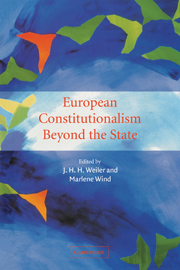Book contents
- Frontmatter
- Contents
- Notes on contributors
- Introduction: European constitutionalism beyond the state
- Part I
- Part II
- Part III
- 6 Beyond representative democracy: constitutionalism in a polycentric polity
- 7 Finality vs. enlargement: constitutive practices and opposing rationales in the reconstruction of Europe
- Epilogue: europe and the dream of reason
- Index
6 - Beyond representative democracy: constitutionalism in a polycentric polity
Published online by Cambridge University Press: 26 June 2009
- Frontmatter
- Contents
- Notes on contributors
- Introduction: European constitutionalism beyond the state
- Part I
- Part II
- Part III
- 6 Beyond representative democracy: constitutionalism in a polycentric polity
- 7 Finality vs. enlargement: constitutive practices and opposing rationales in the reconstruction of Europe
- Epilogue: europe and the dream of reason
- Index
Summary
Introduction
For many years, discussions on the legitimacy of the European institutions have revolved around the place of the parliamentary branch in the institutional system. The alleged weakness of the European Parliament and the inability of most national assemblies to influence the behaviour of their executive significantly were perceived as the core of the Union's ‘democratic deficit’. The European Parliament itself was not slow in raising the issue. From the mid-1980s onwards, it has repeatedly emphasized that while the competences transferred to the European Community were mostly of a legislative nature, its own legislative powers remained weaker than those of national legislatures, which situation was said to result in a weakening of the democratic quality of European decision-making.
Interestingly, this parliamentary vision of democracy has featured prominently in the positions taken by institutions that did not share the European Parliament's vested interest in promoting its own role. Thus, in the discussions on institutional reform since the mid-1980s, many national governments have regularly advocated an increase in the powers of the European Parliament – a position which apparently had the support of large sectors of the population in countries like Germany or Italy. Similarly, in its now-famous ruling on the Maastricht Treaty, the German Constitutional Court identified in the institutional weakness of the European Parliament the main shortcoming in the democratic credentials of the European Union:
Where [the European Union] assumes sovereign tasks and exercises sovereign powers to carry them out, it is first and foremost for the national peoples of the Member States to provide democratic control via their national parliaments. Nevertheless, as the Community's tasks and powers are expanded, so the need grows to add to the democratic legitimacy and influence imparted through the national parliaments by securing the representation of the national populations of the Member States in a European Parliament, as a source of additional democratic underpinning for the policies of the European Union.
- Type
- Chapter
- Information
- European Constitutionalism beyond the State , pp. 135 - 156Publisher: Cambridge University PressPrint publication year: 2003
- 5
- Cited by

